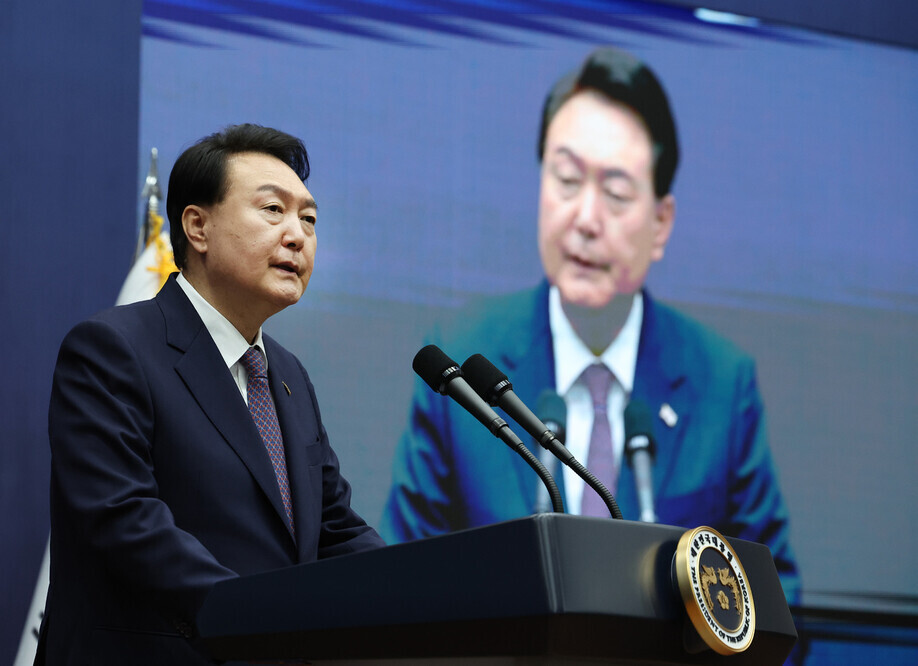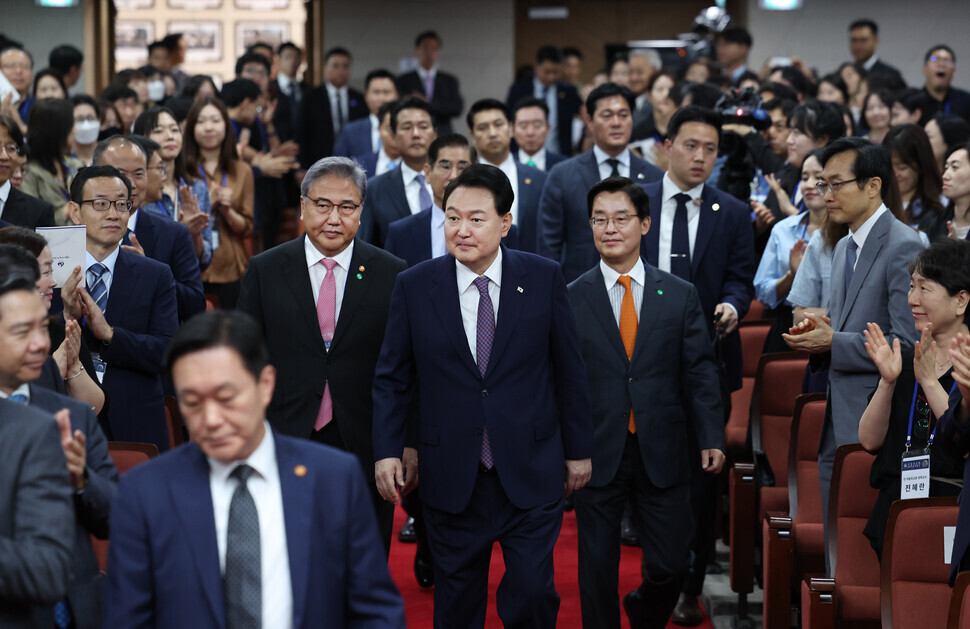hankyoreh
Links to other country sites 다른 나라 사이트 링크
Yoon says concern about biased diplomacy is being incited by “communist totalitarian forces”

On Friday, South Korean President Yoon Suk-yeol lambasted his political critics and others concerned about his foreign policy bias toward the US and Japan.
“Communist totalitarian forces, their opportunistic followers, and anti-state forces are inciting anti-Japanese sentiment and misrepresenting the cooperative arrangement we reached with the US and Japan at Camp David as something that will endanger the Republic of Korea and the Korean people,” Yoon said.
“Our current freedoms are constantly under threat,” Yoon said while delivering a message to celebrate the 60th anniversary of the at the Korean National Diplomatic Academy establishment.
Yoon’s fusillade implied that “communist totalitarian forces” or “anti-state forces” lie behind criticism of his administration for adopting a foreign policy that’s biased toward the US and Japan without first canvassing public opinion.
Yoon also appears to have been venting his spleen about groups that have slammed his response to the Japanese government’s release of contaminated water from the Fukushima Daiichi nuclear power plant.
In the same message, Yoon asserted the need to further orient Korea’s foreign policy on the US and Japan.
“We need to build an even stronger cooperative network in the areas of national security, the economy, information technology, and cutting-edge technology with countries that share the universal values of freedom, human rights, and the rule of law and with countries that respect the rules-based international order. An ambiguous foreign policy line means the absence of values and philosophy. A foreign policy that cannot be predicted by our counterparts is unable to either achieve credibility or serve the national interest,” the Korean president said.

Yoon’s comments appear to represent criticism of the foreign policy of previous administrations that have sought to serve the national interest by maintaining strategic ambiguity and not adopting a hostile stance toward China or Russia. His comments also imply that he means to continue increasing cooperation with the US and Japan going forward.
“President Yoon feels wholly uncomfortable with being the only country bordering a communist and totalitarian state. He intends to keep sending messages about instilling values. He seeks not to divide the public but to establish the correct ideas,” a source at the presidential office told the Hankyoreh.
But experts point to the dangers of Yoon’s stubborn adherence to his current course.
“The very fact that Yoon views everyone who criticizes his policies on Japan’s contaminated water, historical issues, and the US and Japan as being dupes of communist propaganda is itself worrisome,” said Moon Heung-ho, dean of the Graduate School of International Studies at Hanyang University.
“Considering that flexibility is the hallmark of foreign policy, the president’s emphasis on ideology and exclusion of differing opinions in regard to his foreign policy agenda not only subordinates foreign policy to domestic politics but also makes it hard to devise a pragmatic foreign policy,” Moon added.
“Even the US, which Yoon regards as the model of foreign policy, takes a pragmatic approach to foreign policy when the national interest is at stake. Considering that we’re nowhere near as strong as the US, insisting on excessive purity in our foreign policy isn’t the best idea. The ideal foreign policy is to effectively manage and minimize elements that are harmful to Korea while bolstering the credibility of the alliance,” said Hong Hyun-ik, former chancellor of the Korean National Diplomatic Academy.
Yoon held a separate town hall meeting Friday with 38 new candidates for diplomatic posts.
By Bae Ji-hyun, staff reporter; Jang Ye-ji, staff reporter
Please direct questions or comments to [english@hani.co.kr]

Editorial・opinion
![[Correspondent’s column] The real reason the US is worried about Chinese ‘overcapacity’ [Correspondent’s column] The real reason the US is worried about Chinese ‘overcapacity’](https://flexible.img.hani.co.kr/flexible/normal/500/300/imgdb/original/2024/0510/5217153290112576.jpg) [Correspondent’s column] The real reason the US is worried about Chinese ‘overcapacity’
[Correspondent’s column] The real reason the US is worried about Chinese ‘overcapacity’![[Editorial] Yoon’s gesture at communication only highlights his reluctance to change [Editorial] Yoon’s gesture at communication only highlights his reluctance to change](https://flexible.img.hani.co.kr/flexible/normal/500/300/imgdb/original/2024/0510/7717153284590168.jpg) [Editorial] Yoon’s gesture at communication only highlights his reluctance to change
[Editorial] Yoon’s gesture at communication only highlights his reluctance to change- [Editorial] Perilous stakes of Trump’s rhetoric around US troop pullout from Korea
- [Guest essay] Preventing Korean Peninsula from becoming front line of new cold war
- [Column] The state is back — but is it in business?
- [Column] Life on our Trisolaris
- [Editorial] Penalties for airing allegations against Korea’s first lady endanger free press
- [Editorial] Yoon must halt procurement of SM-3 interceptor missiles
- [Guest essay] Maybe Korea’s rapid population decline is an opportunity, not a crisis
- [Column] Can Yoon steer diplomacy with Russia, China back on track?
Most viewed articles
- 1Korea likely to shave off 1 trillion won from Indonesia’s KF-21 contribution price tag
- 2Nuclear South Korea? The hidden implication of hints at US troop withdrawal
- 3[Editorial] Perilous stakes of Trump’s rhetoric around US troop pullout from Korea
- 4With Naver’s inside director at Line gone, buyout negotiations appear to be well underway
- 5In Yoon’s Korea, a government ‘of, by and for prosecutors,’ says civic group
- 6[Column] ‘Choson’: Is it time we start referring to N. Korea in its own terms?
- 7‘Free Palestine!’: Anti-war protest wave comes to Korean campuses
- 8How many more children like Hind Rajab must die by Israel’s hand?
- 9Overseeing ‘super-large’ rocket drill, Kim Jong-un calls for bolstered war deterrence
- 10[Photo] ‘End the genocide in Gaza’: Students in Korea join global anti-war protest wave